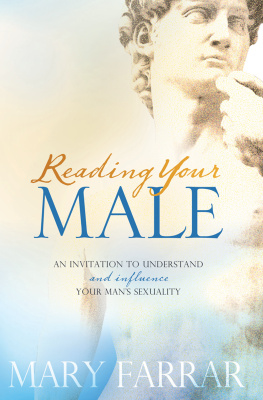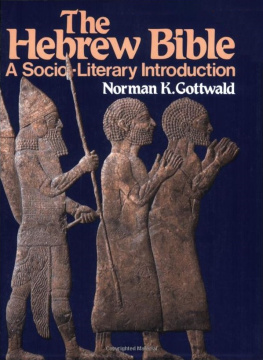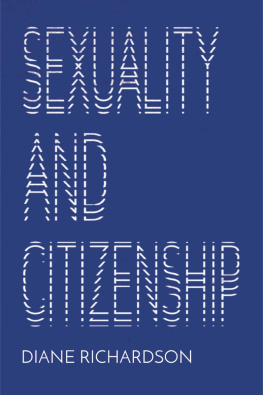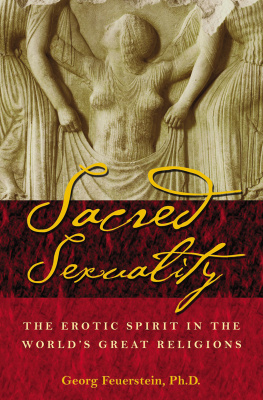SEXUAL HOSPITALITY IN THE HEBREW BIBLE
Gender, Theology and Spirituality
Series Editor: Lisa Isherwood, University of Winchester
Gender, Theology and Spirituality examines the gendered nature of theology and spirituality. Volumes in the series explore a range of topics, oft en employing materialist and radical readings, and frequently questioning the notion of gender itself. The series aims to expand the boundaries of theology and spirituality through an engagement with embodied knowledge and critical praxis.
Sexual Hospitality in the Hebrew Bible
Patronymic, Metronymic, Legitimate and Illegitimate Relations
Thalia Gur-Klein
First published 2013 by Equinox, an imprint of Acumen
Published 2014 by Routledge
2 Park Square, Milton Park, Abingdon, Oxon OX14 4RN
711 Third Avenue, New York, NY 10017, USA
Routledge is an imprint of the Taylor & Francis Group, an informa business
Thalia Gur-Klein 2013
All rights reserved. No part of this book may be reprinted or reproduced or utilised in any form or by any electronic, mechanical, or other means, now known or hereafter invented, including photocopying and recording, or in any information storage or retrieval system, without permission in writing from the publishers.
Notices
Practitioners and researchers must always rely on their own experience and knowledge in evaluating and using any information, methods, compounds, or experiments described herein. In using such information or methods they should be mindful of their own safety and the safety of others, including parties for whom they have a professional responsibility.
To the fullest extent of the law, neither the Publisher nor the authors, contributors, or editors, assume any liability for any injury and/or damage to persons or property as a matter of products liability, negligence or otherwise, or from any use or operation of any methods, products, instructions, or ideascontained in the material herein.
ISBN: 978-1-84553-105-8 (hardback)
British Library Cataloguing-in-Publication Data
A catalogue record for this book is available from the British Library.
Library of Congress Cataloging-in-Publication Data
Gur-Klein, Thalia.
Sexual hospitality in the Hebrew Bible: patronymic, metronymic, legitimate, and illegitimate relations / Thalia Gur-Klein.
p. cm. (Gender, theology, and spirituality)
Includes bibliographical references (p.) and index.
ISBN 978-1-84553-105-8 (hb)
1. Sex in the Bible. 2. Hospitality in the Bible. 3. Bible. O.T.Social scientific criticism. I. Title.
BS1199.S45G87 2012
221.83067-dc23
2011021322

Contents
To my father, Shlomo, who taught me love of learning and books. To my grandmother Regina and my mother, Aliza, who taught me to be a Jewish woman, to persevere and aspire to study against all odds; to my daughters, Shira and Riva, who taught me the meaning of unconditional love.
To my reader, I have aspired in this book to find a compromise between an academic book and a reading book that speaks to and is open to all and relates the Hebrew Bible as a story about people like you and me.
My research will question how culture, history and religion loom large on forms of marriage and sexual relations in the Hebrew Bible. I shall investigate the way socioeconomic concepts either legitimize or outlaw such relations. Furthermore, I shall draw on historical and anthropological perspectives to highlight Hebrew concepts of marriage and sexual relations in comparative perspectives of the biblical time. Drawing on both local and peripheral contingency, comparative data shed light on the demarcating categories that define, regulate and enforce bars on sexual relations in ancient Hebrew culture. Assuming that, since time immemorial, humans have led communal life, conceivably, groups have always generated rules to demarcate their relations. Boundaries lend a group regulating systems, coherence and identity, shackling personal drives to interrelational imperatives. Accordingly, I start my analysis by quoting from Louis Epsteins monumental work Sex Laws and Customs in Judaism: There is rarely a race so primitive but it has a code of sex morality (Epstein [1948] 1967: 3).
Atavist cultures derive legitimacy for sexual relations from mutual consent between families or groups. By inference, women may be protected by their guardians but deprived of sexual autonomy, while claiming recourse to their sexuality of their own accord may lead to social vulnerability and exposure. The modern mind is saddled with the past. However, our contemporary perception of sexuality has divorced itself from ancient codes in many ways but our conceptualization of sexuality is still confined to a code of legitimate behaviour, albeit on different concepts. Modern culture defines legitimate sexuality by mutual consent of mature individuals, and draws legitimacy from interrelationality and free choice. It is from the pretext of egalitarian relationality that an emancipated woman claims legitimacy for relations on equal terms, rights and lawful protection of her well-being. Both diverging and converging, both old and modern cultures struggle with concepts of legitimacy, outlawry, coercion and consent.
What then is the threatening power posed by sexuality? Why is it so crucial for societies to contain, regulate or outlaw sexuality in one context and conversely liberate it from constraints in another? Lvi-Strauss positions sexuality in the tension between human drives to satisfy sexual desire and human dependence on stimulation from another person, which connects sexuality to both nature and culture: If the regulation of relationships between the sexes represents an overflow of culture into nature, in another way sexual life is one beginning of social life in nature (1969:12). These pos-tulations present sexuality a crossroad between individuality and interrelationality, and between culture which is cultivated, socialized, restrictive and imposes the presence of others, and the natural which pushes its stamina against restrictions. As a corollary, Tikva Frymer-Kinskey (1999) postulates that the contingency of sexuality lies in its power to infringe on both culture and nature. Exacting power to dissolve categorization and defy social demarcation, sexuality ramifies from the personal to the interpersonal and from the natural to the cultural and social.
Expanding on these prepositions, we see biblical concepts of legitimate and illegitimate sexual relations ramifying into extensive sets of categories that define permissible and impermissible partners. This set of laws propels sexuality outside individual discretion, giving society, its elders, God and the incorporated family represented by its head the power of mandatory sentencing. Examples can be seen in the story of Tamar and in the laws of Leviticus and Deuteronomy where sexual impropriety is alternately punished and delegated by God, paterfamilias and society (Lev. 18, 20; Gen. 38:10, 24; Deut. 22:2029, 23:1).
Sexual licence infringes on the domestic as well as the social dimensions. Eventually, sexual morality in the Hebrew Bible is promulgated in legal codes while narratives actuate, modify and expound on them. As womens sexuality and the right to consummate it are social and domestic matters, guardians are invested with authority over the conduct and choices of their female family members. Such guardians are a womans father and brother before her marriage and, on her marriage, her husband and eventually his family after his death (Exod. 22:1516; Gen. 12:13; 29:23, 28; 34:31; Deut. 22:2029; 2 Sam. 13:14, 2122; Judg. 21:22; 1 Kgs 2:17; Ruth 3:16). In practice, a womans consent, be she unmarried or married, is inconclusively represented, resurfacing as secondary, taken for granted or absent altogether in both legal codes and narratives.










 Contents
Contents